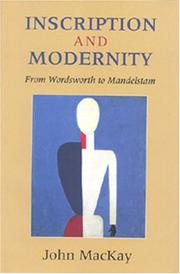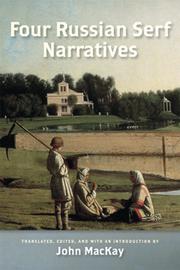| Listing 1 - 10 of 97 | << page >> |
Sort by
|

ISBN: 1282072854 9786612072857 0253112036 9780253112033 0253347491 9780253347497 9781282072855 6612072857 Year: 2006 Publisher: Bloomington Indiana University Press
Abstract | Keywords | Export | Availability | Bookmark
 Loading...
Loading...Choose an application
- Reference Manager
- EndNote
- RefWorks (Direct export to RefWorks)
Inscription and Modernity charts the vicissitudes of inscriptive poetry produced in the midst of the great and catastrophic political, social, and intellectual upheavals of the late 18th to mid 20th centuries. Drawing on the ideas of Geoffrey Hartman, Perry Anderson, Fredric Jameson, and Jacques Rancière among others, John MacKay shows how a wide range of Romantic and post-Romantic poets (including Wordsworth, Clare, Shelley, Hölderlin, Lamartine, Baudelaire, Blok, Khlebnikov, Mandelstam, and Rolf Dieter Brinkmann) employ the generic resources of inscription both to justify their writing and to attract a readership, during a complex historical phase when the rationale for poetry and the identity of audiences were matters of intense yet productive doubt.
Inscriptions. --- Lyric poetry --- European poetry --- Epigraphs (Inscriptions) --- Epigraphy --- Inscription --- Paleography --- Epigraphists --- History and criticism.

ISBN: 0299233731 9780299233730 029923374X 9780299233747 9780299233747 Year: 2009 Publisher: Madison, Wis. : University of Wisconsin Press,
Abstract | Keywords | Export | Availability | Bookmark
 Loading...
Loading...Choose an application
- Reference Manager
- EndNote
- RefWorks (Direct export to RefWorks)
Although millions of Russians lived as serfs until the middle of the nineteenth century, little is known about their lives. Identifying and documenting the conditions of Russian serfs has proven difficult because the Russian state discouraged literacy among the serfs and censored public expressions of dissent. To date scholars have identified only twenty known Russian serf narratives. Four Russian Serf Narratives contains four of these accounts and is the first translated collection of autobiographies by serfs. Scholar and translator John MacKay brings to light for an English-language audience a diverse sampling of Russian serf narratives, ranging from an autobiographical poem to stories of adventure and escape. "Autobiography" (1785) recounts a highly educated serf's attempt to escape to Europe, where he hoped to study architecture. The long testimonial poem "News About Russia" (ca. 1849) laments the conditions under which the author and his fellow serfs lived. In "The Story of My Life and Wanderings" (1881) a serf tradesman tells of his attempt to simultaneously escape serfdom and captivity from Chechen mountaineers. The fragmentary "Notes of a Serf Woman" (1911) testifies to the harshness of peasant life with extraordinary acuity and descriptive power. These accounts offer readers a glimpse, from the point of view of the serfs themselves, into the realities of one of the largest systems of unfree labor in history. The volume also allows comparison with slave narratives produced in the United States and elsewhere, adding an important dimension to knowledge of the institution of slavery and the experience of enslavement in modern times.
Serfdom --- Serfs --- Servitude --- Forced labor --- Land tenure --- Slavery --- Villeinage --- History --- Law and legislation --- Persons
Book
ISBN: 0299292932 9780299292935 9780299292942 0299292940 1299730779 Year: 2013 Publisher: Madison The University of Wisconsin Press
Abstract | Keywords | Export | Availability | Bookmark
 Loading...
Loading...Choose an application
- Reference Manager
- EndNote
- RefWorks (Direct export to RefWorks)
Stowe, Harriet Beecher, --- Bicher-Stou, Khenriet, --- Stowe, H. B. --- Stou, Khenriet Bicher-, --- Stowe, Enriqueta B., --- Stowe, Harriet Elizabeth Beecher, --- Beecher, Harriet Elizabeth, --- Bicher-Stou, G. --- Bicher-Stou, Garriet, --- Stou, Garriet Bicher-, --- Bicher-Stou, Ḣarrii̐et, --- Bicher-Stou, Ḣ. --- Stou, Ḣarrii̐et Bicher-, --- Beecher-Stowe, Harriet, --- Ssu-tʻu-huo, --- Beecher-Stowe, H. --- Stowe, H. Beecher-, --- Bētser-Stoou, --- Crowfield, Christopher, --- Beecher, H. --- Sṭav, Hēriyaṭ Pīccar, --- Sṭo, Haryeṭ Bits'er, --- Bits'er Sṭo, Haryeṭ, --- ביטשער סאאו --- ביטשער־סטאו --- סטאו, הערריעט ביטשער --- סטאו, הערריעט ביטשער, --- סטו, ביצ׳ר, --- ハリエットビーチャーストウ, --- Beecher Stowe, Harriet --- Beecher Stowe, Henriette --- Beecher Stowe, H. --- Stowe, Harriet Beecher --- Stowe, Harriet Elizabeth --- Bicher-Stou, Khenriet --- Stou, Khenriet Bicher --- -Stowe, Enriqueta B. --- Stowe, Harriet Elizabeth Beecher --- Beecher, Harriet Elizabeth --- Bicher-Stou, Garriet --- Stou, Garriet Bicher --- -Bicher-Stou, Ḣarrii̐et --- Stou, Ḣarrii̐et Bicher --- -Beecher-Stowe, Harriet --- Ssu-tʻu-huo --- Stowe, H. Beecher --- -Bētser-Stoou --- Crowfield, Christopher --- Sṭav, Hēriyaṭ Pīccar --- Sṭo, Haryeṭ Bits'er --- Bits'er Sṭo, Haryeṭ --- Translations into Russian --- History and criticism. --- Influence. --- Appreciation --- Soviet Union --- Russia --- Intellectual life. --- Intellectual life --- American literature
Book
ISBN: 9781618117342 1618117343 Year: 2018 Publisher: Boston (Mass.) : Academic studies press,
Abstract | Keywords | Export | Availability | Bookmark
 Loading...
Loading...Choose an application
- Reference Manager
- EndNote
- RefWorks (Direct export to RefWorks)
Vertov, Dziga, --- Vertov, Dziga, --- Criticism and interpretation.
Book
Year: 1836 Publisher: Edinburgh Laing and Forbes
Abstract | Keywords | Export | Availability | Bookmark
 Loading...
Loading...Choose an application
- Reference Manager
- EndNote
- RefWorks (Direct export to RefWorks)
Book
ISBN: 1618117351 Year: 2018 Publisher: Boston, MA : Academic Studies Press,
Abstract | Keywords | Export | Availability | Bookmark
 Loading...
Loading...Choose an application
- Reference Manager
- EndNote
- RefWorks (Direct export to RefWorks)
Largely forgotten during the last 20 years of his life, the Soviet filmmaker Dziga Vertov (1896-1954) has occupied a singular and often controversial position over the past sixty years as a founding figure of documentary, avant-garde, and political-propaganda film practice. Creator of "Man with a Movie Camera" (1929), perhaps the most celebrated non-fiction film ever made, Vertov is equally renowned as the most militant opponent of the canons of mainstream filmmaking in the history of cinema. This book, the first in a three-volume study, addresses Vertov's youth in the largely Jewish city of Bialystok, his education in Petrograd, his formative years of involvement in filmmaking, his experiences during the Russian Civil War, and his interests in music, poetry and technology.
Marxism. --- Soviet culture. --- avant-garde. --- cinema. --- communism. --- documentary. --- experimental art. --- media studies. --- propaganda. --- sound studies. --- Vertov, Dziga, --- Criticism and interpretation.
Book
ISBN: 9781618117359 9781618116031 1618116037 1618117351 9781618117342 Year: 2018 Publisher: Boston
Abstract | Keywords | Export | Availability | Bookmark
 Loading...
Loading...Choose an application
- Reference Manager
- EndNote
- RefWorks (Direct export to RefWorks)
Multi
ISBN: 9781618117359 9781618117342 1618117343 1618117351 164469011X Year: 2018 Publisher: Boston, Mass. Academic Studies Press
Abstract | Keywords | Export | Availability | Bookmark
 Loading...
Loading...Choose an application
- Reference Manager
- EndNote
- RefWorks (Direct export to RefWorks)
Largely forgotten during the last 20 years of his life, the Soviet filmmaker Dziga Vertov (1896-1954) has occupied a singular and often controversial position over the past sixty years as a founding figure of documentary, avant-garde, and political-propaganda film practice. Creator of "Man with a Movie Camera" (1929), perhaps the most celebrated non-fiction film ever made, Vertov is equally renowned as the most militant opponent of the canons of mainstream filmmaking in the history of cinema. This book, the first in a three-volume study, addresses Vertov's youth in the largely Jewish city of Bialystok, his education in Petrograd, his formative years of involvement in filmmaking, his experiences during the Russian Civil War, and his interests in music, poetry and technology.
Art --- Vertov, Dziga, --- Criticism and interpretation. --- Marxism. --- Soviet culture. --- avant-garde. --- cinema. --- communism. --- documentary. --- experimental art. --- media studies. --- propaganda. --- sound studies.
Book
ISBN: 3921388163 Year: 1977 Publisher: Freiburg/Br. : Mackay-Gesellschaft,
Abstract | Keywords | Export | Availability | Bookmark
 Loading...
Loading...Choose an application
- Reference Manager
- EndNote
- RefWorks (Direct export to RefWorks)
Book
ISBN: 0707300533 Year: 1974 Publisher: London Geological society of London
Abstract | Keywords | Export | Availability | Bookmark
 Loading...
Loading...Choose an application
- Reference Manager
- EndNote
- RefWorks (Direct export to RefWorks)
Geology --- Geognosy --- Geoscience --- Earth sciences --- Natural history --- Bibliography --- Information services
| Listing 1 - 10 of 97 | << page >> |
Sort by
|

 Search
Search Feedback
Feedback About UniCat
About UniCat  Help
Help News
News